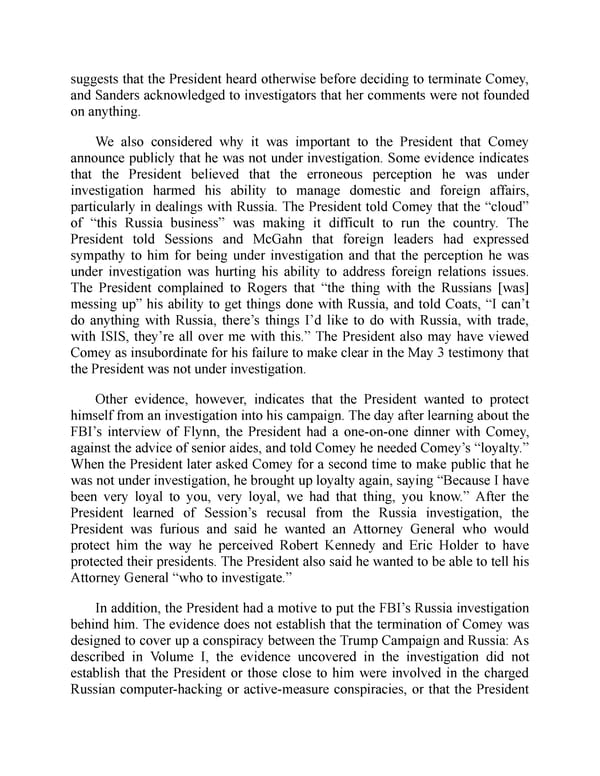suggests that the President heard otherwise before deciding to terminate Comey, and Sanders acknowledged to investigators that her comments were not founded on anything. We also considered why it was important to the President that Comey announce publicly that he was not under investigation. Some evidence indicates that the President believed that the erroneous perception he was under investigation harmed his ability to manage domestic and foreign affairs, particularly in dealings with Russia. The President told Comey that the “cloud” of “this Russia business” was making it difficult to run the country. The President told Sessions and McGahn that foreign leaders had expressed sympathy to him for being under investigation and that the perception he was under investigation was hurting his ability to address foreign relations issues. The President complained to Rogers that “the thing with the Russians [was] messing up” his ability to get things done with Russia, and told Coats, “I can’t do anything with Russia, there’s things I’d like to do with Russia, with trade, with ISIS, they’re all over me with this.” The President also may have viewed Comey as insubordinate for his failure to make clear in the May 3 testimony that the President was not under investigation. Other evidence, however, indicates that the President wanted to protect himself from an investigation into his campaign. The day after learning about the FBI’s interview of Flynn, the President had a one-on-one dinner with Comey, against the advice of senior aides, and told Comey he needed Comey’s “loyalty.” When the President later asked Comey for a second time to make public that he was not under investigation, he brought up loyalty again, saying “Because I have been very loyal to you, very loyal, we had that thing, you know.” After the President learned of Session’s recusal from the Russia investigation, the President was furious and said he wanted an Attorney General who would protect him the way he perceived Robert Kennedy and Eric Holder to have protected their presidents. The President also said he wanted to be able to tell his Attorney General “who to investigate.” In addition, the President had a motive to put the FBI’s Russia investigation behind him. The evidence does not establish that the termination of Comey was designed to cover up a conspiracy between the Trump Campaign and Russia: As described in Volume I, the evidence uncovered in the investigation did not establish that the President or those close to him were involved in the charged Russian computer-hacking or active-measure conspiracies, or that the President
 Mueller Report PDF Page 343 Page 345
Mueller Report PDF Page 343 Page 345